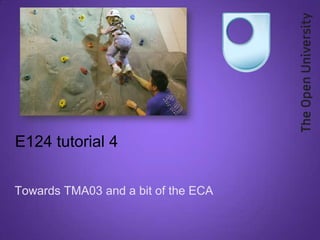
E124 Tutorial 4
- 1. E124 tutorial 4 Towards TMA03 and a bit of the ECA
- 2. TMA03 draws on study topics 12, 16 and 17 Not likely to be as fast: I usually mark in order of arrival. Do not use ‘signed for’ in any way If you are running even a day late tell me otherwise you run the risk of an L
- 6. TMA 03 continued 1 Introduction (100 words) Briefly describe the two experiences/activities you have chosen, and the curriculum documents or frameworks that guide practice in your setting. This means specific links by page to EYFS or Key Stage 1
- 7. TMA 03: part 2 and 4 Describe the first learning experience/activity: the child(ren) involved, how often the activity takes place, and how it relates to your planning. You should provide a rationale for the learning experience/activity in terms of the child(ren)’s development and well-being. Say why you are doing the activity, give reasons and support with references You will also need to explain how the learning experience/activity relates to curriculum guidance for your setting and any other relevant policy documents. This means either EYFS or Key Stage 1 guidance
- 8. TMA 03 analysis How does the experience/activity build on what you know about the child(ren)? How does the experience/activity take account of the child(ren)’s prior learning or build on their experiences? How does the experience/activity support and extend the child(ren)’s learning? What was your role in supporting learning? How could you further extend the child(ren)’s learning? How does the activity relate to published curriculum guidance and/or guidance for your setting? You need to analyse to show how or in what way the activity adds to the learning , develops from and extends previous learning. Analyse your role…relate this to theoretical perspectives What are the possible extensions…why choose this extension Relate to EYFS does it vary form EYFS or go further, if so demonstrate this.
- 9. TMA 03- 6-Supporting Learning your support must relate to learning across the curriculum…holistic approach. You may include brief vignettes of your practice, illustrate key points. It is important that you reflect on and evaluate different approaches, and highlight areas you would like to develop. It may be helpful if you make a spidergram of the different ways in which you support children’s learning, then select three or four approaches which allow you to demonstrate the breadth and depth of your knowledge, understanding and skills. The spider gram should be used as a planning tool; you may want to include it in the appendices and refer to it in the main body of the assignment. Do not let the vignette take over! Evaluate different approaches Demonstrate breadth and depth Do a spider diagram: discuss
- 11. Assessment Grid Excellent links made between the course materials, developing practice and thinking. Links- this means references Developing practice- this means how your practice is changing as a result of course activities and materials Developing thinking- shows best in your analysis and reflection Structure of the assignment is excellent. Ideas are expressed very clearly and logically. Appropriate source referencing. Structure- in sections with good paragraphs Clear expression- good English, short clear sentences, economy with words one idea flowing to the next. Reference according to guidance.
- 12. Paragraphs You need to use word wrap when typing, only use enter key for a pragraph break. Paragraphs typically start with a topic sentence which is then expanded on in the rest of the paragraph. For examples lets look at the Study Guide/Reader. Finding the paragraph activity.
- 13. Activity 4: Study Topic 10 Activity4 The environment and community This activity requires you to think about the activities you do weekly with the children in your care. Consider the following questions and jot down your thoughts in your notebook: How often do the children have contact with people in the community? How often do they go out to visit people and places? How often do people visit the setting to share their expertise or work alongside the children? What do you think children might gain from such experiences in terms of knowledge and understanding of the world? What skills would they develop? How could you extend, develop and improve children’s experiences in the community?
- 14. Activity 2 Study Topic 12 Are there any children who you feel are more physically developed or more mature than others? If so, why do you think this is? Is it because of their height or weight? If there are some children who are tall for their age, do you treat them differently from children who are not as tall? Do any of the children have loose teeth or seem to have grown a lot recently? If so, do you feel that these physical changes have affected their behaviour? How do the children present themselves physically? Are there children who cannot sit still, or want to lie stretched out, or fidget with objects, or are awkward in their movements? If so, how do you react to them? Are you sympathetic or critical?
- 15. Finishing off: using word Do you know how to use headers and footers? Page numbers? Do you know how to make your work into paragraphs? Do you know how to word count the document or a section? Do you know how to set line spacing and margins?
